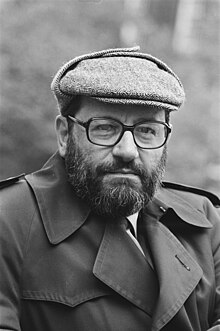
Back Umberto Eco Afrikaans Umberto Eco ALS Umberto Eco AN أومبرتو إكو Arabic اومبرتو اكو ARZ Umberto Eco AST Умберто Эко AV Umberto Eco AVK Umberto Eco Aymara Umberto Eko Azerbaijani
Umberto Eco | |
|---|---|
 Eco in 1984 | |
| Born | 5 January 1932 Alessandria, Piedmont, Kingdom of Italy |
| Died | 19 February 2016 (aged 84) Milan, Lombardy, Italy |
| Alma mater | University of Turin |
| Spouse |
Renate Ramge (m. 1962) |
| Children | 2 |
| Era | 20th-/21st-century philosophy |
| Region | Western philosophy |
| School | Continental philosophy Post-structuralism[1] |
| Institutions | |
Main interests | Semiotics (literary semiotics, film semiotics, comics semiotics) |
Notable ideas |
|
| Signature | |
 | |
Umberto Eco[a] OMRI (5 January 1932 – 19 February 2016) was an Italian medievalist, philosopher, semiotician, novelist, cultural critic, and political and social commentator. In English, he is best known for his popular 1980 novel The Name of the Rose, a historical mystery combining semiotics in fiction with biblical analysis, medieval studies and literary theory, as well as Foucault's Pendulum, his 1988 novel which touches on similar themes.[3]
Eco wrote prolifically throughout his life, with his output including children's books, translations from French and English, in addition to a twice-monthly newspaper column "La Bustina di Minerva" (Minerva's Matchbook) in the magazine L'Espresso beginning in 1985, with his last column (a critical appraisal of the Romantic paintings of Francesco Hayez) appearing 27 January 2016.[4][5] At the time of his death, he was an Emeritus professor at the University of Bologna, where he taught for much of his life.[6] In the 21st century, he has continued to gain recognition for his 1995 essay "Ur-Fascism", where Eco lists fourteen general properties he believes comprise fascist ideologies.
- ^ Nöth, Winfried (21 August 2017), "Umberto Eco: Structuralist and Poststructuralist at Once", Umberto Eco in His Own Words, De Gruyter Mouton, pp. 111–118, doi:10.1515/9781501507144-014, ISBN 978-1-5015-0714-4
- ^ Umberto Eco, Interpretation and Overinterpretation, Cambridge University Press, 1992, p. 25.
- ^ Thomson, Ian (20 February 2016). "Umberto Eco obituary". the Guardian. Archived from the original on 2 March 2017. Retrieved 1 March 2017.
- ^ "La cattiva pittura di Hayez". l'Espresso (in Italian). 27 January 2016. Archived from the original on 2 December 2020. Retrieved 19 August 2020.
- ^ Parks, Tim (6 April 2016). "Pape Satàn Aleppe by Umberto Eco review – why the modern world is stupid". the Guardian. Archived from the original on 26 May 2020. Retrieved 19 August 2020.
- ^ "Umberto Eco, 1932–2016". The Guardian. Agence France-Presse. 19 February 2016. ISSN 0261-3077. Archived from the original on 10 July 2017. Retrieved 29 June 2017.
Cite error: There are <ref group=lower-alpha> tags or {{efn}} templates on this page, but the references will not show without a {{reflist|group=lower-alpha}} template or {{notelist}} template (see the help page).